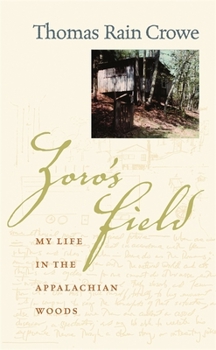Zoro's Field: My Life in the Appalachian Woods
Select Format
Select Condition 
Book Overview
After a long absence from his native southern Appalachians, Thomas Rain Crowe returned to live alone deep in the North Carolina woods. This is Crowe's chronicle of that time when, for four years, he... This description may be from another edition of this product.
Format:Paperback
Language:English
ISBN:0820328626
ISBN13:9780820328621
Release Date:September 2006
Publisher:University of Georgia Press
Length:240 Pages
Weight:0.72 lbs.
Dimensions:0.6" x 6.0" x 8.9"
Customer Reviews
3 ratings
Not so much a "Getting away from" as a "Going back to"
Published by Thriftbooks.com User , 19 years ago
Written accounts of solitary wilderness living show up every once in a while, and seem to have become especially popular after the Baby Boomers "discovered" Thoreau in the 1960s. His words still inspire a few folks to chuck their lives of quiet desperation and head for the hills to get away from it all. Some are successful, some are not. Many stay there only a year or two before the most pressing need -- the financial one -- forces them to return to civilization. That's not the case with Thomas Rain Crowe, who spent four years (1978-1982) living alone in a cabin in the Smoky Mountains of western North Carolina. Crowe went back to his home state after living in a variety of places, doing a variety of work, communing with a variety of people. When given the opportunity to be the cabin tenant, he made the most of it. He worked hard to be self-sufficient, growing his own food and tending to his home and his tools. Others might have been bored in such a setting, but not him. He was always busy: gardening, fishing, taking care of his beehives, making homebrew, digging his root cellar, taking notes on the experience. And he regained the use of one his most valuable resources, the Southern Mountain speech of his childhood. He was downright satisfied with the situation. His mentors in this effort were several local men who offered advice from time to time: Zoro Guice appeared in Yoda-like fashion whenever Crowe needed to learn how to perform a certain task. Walt Johnson was the scamp of the neighborhood, but was also an accomplished dowser who could find water every time. From these and other natives Crowe learned how to live close to the land, to live in the time of the seasons. The reader senses that Crowe would be living there still, if civilization hadn't encroached upon the property and changed it forever. That's when he knew he had to leave. Not just a doer, Crowe is also a viewer -- a writer, a poet, a spiritual man who feels a strong connection to the natural world. His poetry uses simple words and turns of phrase to evoke powerful images. On the other hand, his prose, the narrative of his story, is the work of a learned and literate man. Complex constructs entice the reader to keep on going, to chew on the concepts and experiences offered. It takes time to digest these lines, and it's time well spent. Having witnessed Thomas Rain Crowe read some of this book aloud in person, I have the benefit of having heard the hint of the Smokies in his voice, the love for the place evident in every well-spoken syllable. No matter; it comes through in the typewritten text as well. So was Thomas Wolfe right or wrong? Can you or can't you go home again? The reader decides. In the meantime, "Zoro's Field" should be placed on a shelf with the works of the old and new naturalists (Thoreau, Burroughs, Leopold, Carson, Eiseley, Bass) to one side, and the "Foxfire" books to the other. A thought-provoking addition to the environmental can
living with nature in Appalachian region
Published by Thriftbooks.com User , 19 years ago
The local legend and mountain sage of the Appalachians of western North Carolina Zoro Guice told the author, "If a man goes out in the woods and just sits down in one place for long enough, all of nature and everything he needs to know will eventually pass before him like a parade." And so Crowe--poet, publisher, and recording artist--took up residence in the Appalachians for four years, and writes about the "parade." As in Thoreau's "Walden," Crowe writes about how he subsisted in the wild and what he learned from this. But moving somewhat beyond "Walden" in content and form, Crowe writes more about what goes on beyond himself; and some passages are in the form of verse. Not so meticulous or contained as "Walden," "Zoro's Field" reflects on modernity's effects on the tie with nature, environmental concerns, and changes which have come to the area. Though different in ways from Thoreau's classic which it cannot help but be compared with, Crowe's work in this same genre holds its own as an engaging, thought-inducing memoir.
Native
Published by Thriftbooks.com User , 19 years ago
More than a modern Walden, this is a book about intentional living. Crowe returns to home land in the southern mountains of North Carolina after living in Europe and northern California. Guided by principles of the Beat poets and philosophers, he embraces the traditions of sustenance, growing his own food, tending bees (honey for trade), making wine and beer. From his cabin beside the Green River gorge, he explores both terrain and history in celebration of a way of life that has been largely lost. The book is elegant and poetic. Crowe writes with an easy style, but critical intellect.





